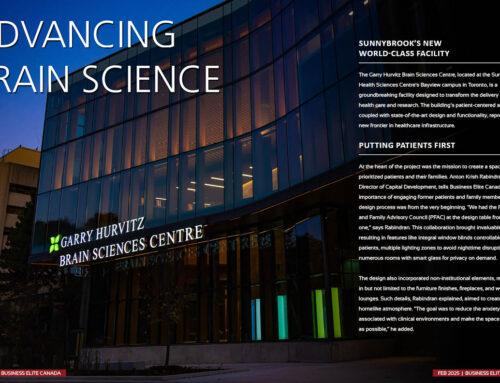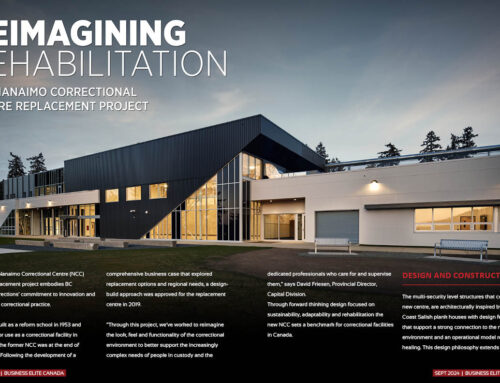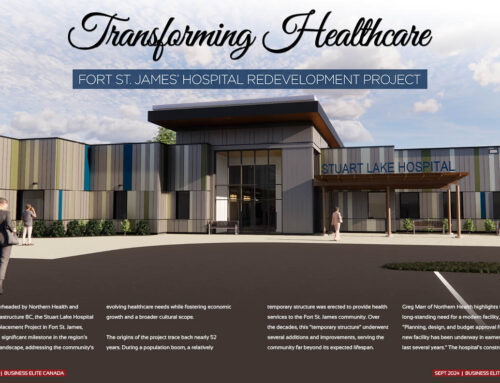Residents of Northwestern British Columbia will soon benefit from a significant transformation in its healthcare landscape with the development of the new Mills Memorial Hospital and the Seven Sisters rehabilitation centre.
These projects represent a significant investment in the health and well-being of the community, bringing advanced medical services, improved mental health care, and economic benefits to the region. As these facilities become operational, they will not only provide immediate benefits to patients but also contribute to the long-term resilience and prosperity of Northwestern B.C.
The new Mills Memorial Hospital, located in Terrace, B.C., is poised to become a cornerstone of healthcare services in the region. The replacement hospital is a $622.6 million project designed to provide expanded and improved medical services to the residents of Northwestern B.C. The new facility will be significantly larger than its predecessor, featuring 78 beds, including 44 for acute care, and offering a wide range of medical services including emergency care, surgery, maternity, and mental health services.
“Our current facility, built in the 1960s, is starting to show its age, which prompted the programming and discussions around new builds that began in 2021,” says Sarah Artis, Project Liaison, Mills Memorial Hospital Replacement Project.
“As the epicenter of the northwest, we serve numerous smaller communities and provide the majority of medical services in Northwestern B.C.,” continues Artis. “When we discussed building a new hospital, our goal was to meet the needs of a larger outreach area and provide specialized services that we currently lack. The new Mills Memorial Hospital will be the largest referral center in the northwest, servicing many First Nations and remote communities along the coast and to the north.”
Advanced Medical Services and Technology
One of the standout features of the new hospital is its focus on integrating advanced medical technologies, says Artis. The hospital will be equipped with cutting-edge diagnostic and treatment tools, ensuring that patients receive the highest standard of care. The inclusion of modern surgical suites and comprehensive diagnostic imaging services will enable more complex procedures to be performed locally, reducing the need for patients to travel long distances for specialized care.
Additionally, the new hospital will have enhanced emergency services with a larger, more efficient emergency department designed to handle higher patient volumes and improve response times. This will be a significant improvement, given the growing population and the increasing demand for emergency healthcare services in the region.
Patient-Centered Design
The design of the new Mills Memorial Hospital places a strong emphasis on creating a healing environment. Patient rooms are designed to be spacious, with large windows providing natural light and views of the surrounding landscapes, which have been shown to improve patient recovery times. Furthermore, the hospital will feature green spaces and areas for relaxation, promoting a holistic approach to health and well-being.
The new hospital will also prioritize accessibility, ensuring that all areas are easily navigable for patients with disabilities. This patient-centered design extends to the inclusion of family-friendly spaces, recognizing the critical role that family and support networks play in the recovery process.
To facilitate the transition, a company called Hospital Relocations, which specializes in healthcare facility transitions, has been brought in. “It has been excellent to collaborate with them to ensure operational readiness and to support the physical move and activation at the new site,” says Artis.
“Between August and November, we will undergo a process called commissioning, during which Northern Health staff will inspect the building to ensure that all light switches, call bells, alarm systems, and other essential components are functioning correctly. In November, 2024, we will execute the actual move, which involves transferring equipment and other necessary items to the new building—a process expected to take about a week. The plan is to move all patients in a single day to ensure a smooth and efficient transition.”
Expanding Mental Health Services
The new Seven Sisters rehabilitation centre is another pivotal development in Northwestern B.C.’s healthcare infrastructure. This $15.8 million project will see the construction of a larger facility to replace the existing centre, expanding its capacity from 20 to 25 beds. This expansion is crucial in addressing the growing need for mental health and substance use services in the region.
The new Seven Sisters centre will adopt an integrated care approach, providing a continuum of services that address both mental health and substance use disorders. This holistic approach is designed to cater to the diverse needs of patients, offering everything from acute psychiatric care to rehabilitation services. By integrating these services under one roof, the centre aims to provide more coordinated and effective treatment plans for its patients.
The facility will feature therapeutic environments, including spaces for group therapy, individual counseling, and recreational activities. These environments are designed to support various aspects of recovery, recognizing that mental health treatment is not one-size-fits-all but rather a complex, multifaceted process, according to Artis.
A key aspect of the new Seven Sisters centre is its commitment to community and cultural sensitivity. Northwestern B.C. is home to a diverse population, including a significant number of Indigenous communities. The centre will work closely with local Indigenous groups to ensure that services are culturally appropriate and accessible. This includes incorporating traditional healing practices and creating a welcoming environment for Indigenous patients and their families.
“Seven Sisters functions as a tiered center for psychiatric care,” says Artis. “We have an acute psychiatry department within the facility, and Seven Sisters, located on the same grounds, provides the next steps from acute psychiatry to eventual independent living. This relationship has been beneficial, with both overseen by Brad, ensuring a seamless connection between acute services and community services.”
Enhanced Healthcare Access
One of the most profound impacts of these projects will be the improved access to healthcare for residents of Northwestern B.C. Historically, patients in this region have often had to travel considerable distances to receive specialized medical care. With the new hospital and rehabilitation centre, these services will be closer to home—reducing travel time and associated stress for patients and their families.
Healthcare infrastructure plays a crucial role in the resilience of a community. The new Mills Memorial Hospital and Seven Sisters rehabilitation centre will significantly strengthen the region’s capacity to respond to health emergencies, whether they be natural disasters, pandemics, or other crises. With advanced medical facilities and a comprehensive range of services, the community will be better equipped to handle health challenges, enhancing overall community resilience.
For more information, please visit https://letstalk.northernhealth.ca/mmh






